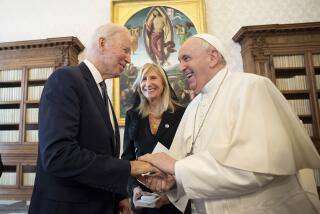Bishops Press for Stand on Farm Troubles
- Share via
WASHINGTON — Roman Catholic bishops, increasingly concerned about the growing economic and social disruption in rural America, particularly in the Midwest, are pressing ahead with a plan to add a section on agriculture to their draft pastoral letter on U.S. economic policy.
A committee of the bishops met earlier this week in Dallas in an unpublicized session, The Times has learned, to hear from church and lay experts about American food and agriculture policy. At least half of the session was devoted to the rapidly deteriorating farm economy and the long-term impact on the rural Midwest.
‘Way of Life’ Dying
“What is driving the issue among the bishops is a concern about the structure of agriculture,” Ron Krietemeyer, director of the office of social policy for the U.S. Catholic Conference, said Thursday. “It is not just an economic issue. A way of life, communities, a whole set of values are being lost.”
A first draft of the pastoral letter, released in November, called for a “bold new experiment in economic democracy” and was instantly controversial because it endorsed dramatic changes in U.S. economic policy to benefit the poor. A second draft is to be sent to the nation’s bishops in May and debated in June.
The chapter on food and agriculture, to be included in that draft, probably will be made public when Congress is debating the 1985 farm bill, which will set U.S. farm policy for the next four years. It could spark still more controversy over the pastoral letter, which will become part of church teachings for years to come.
The decision to include a separate chapter on food and agriculture was made last summer, as the bishops were finishing the first draft of the 136-page, 50,000-word pastoral letter. But the current farm problems gave new impetus to the decision, and Archbishop Ignatius J. Strecker of Kansas City, Kan., head of the Catholic Rural Life Conference, began pressing for a strong statement and helped plan the Sunday and Monday meeting in Dallas.
Tens of thousands of debt-burdened farmers, most of them in the Midwest Farm Belt, could lose their farms this year in a squeeze between high interest rates and low crop prices. Medium-size family farms, long a mainstay of the nation’s rural areas, are considered the most endangered.
“They (the bishops) are clearly concerned about the economic, social and moral questions that result from a concentration of land in a few hands,” according to a participant in the meetings who asked not to be identified.
American Catholic bishops’ involvement in the quality of rural life goes back at least half a century to a document voicing concern about the fate of rural families being forced off the land during the Great Depression.
Focus of Statement
The five-member committee that wrote the current pastoral letter and is drafting the chapter on food and agriculture is still trying to determine the focus of the new statement. Views among committee members reportedly range from treating the issues very broadly to dealing with the immediate farm crisis and the 1985 farm bill.
Krietemeyer said that he expects the bishops to use another forum, and not the pastoral letter, to address questions related to the Reagan Administration’s proposed 1985 farm program, which is to be announced later this month.
More to Read
Sign up for Essential California
The most important California stories and recommendations in your inbox every morning.
You may occasionally receive promotional content from the Los Angeles Times.













